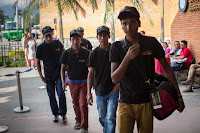In exactly one week, leaders of the world’s nations will gather
for the UN High-Level Meeting on Universal Health Coverage. After
months of tough negotiations, they have reached consensus on a political declaration –
which you can read here – that will be adopted on Monday, 23
September.
The response, as expected, has been mixed. On one hand, the extensive
document touches on many core messages and important issues, including mentions
of migration and SRHR that were debated until the end. At the same time,
weakened or murky language in places will make it easier to loosely interpret
the fundamental principles of UHC: equity, social justice and the right
of every single person to get the quality health services they
need without financial hardship.
One thing is certain: whether you feel skeptical, optimistic or
fired up, this is probably the largest global spotlight on universal health
coverage to date, and another unanimous pledge that leaders will be on the hook
for. We cannot afford not to speak up for what we
believe and demand the urgent actions we need to see.
 That’s why UHC Coalition, UHC2030 and the Civil Society
Engagement Mechanism are teaming up for a 7-day Twitter Storm running
from tomorrow, 17 September until the High-Level Meeting, with one focus
theme per day:
That’s why UHC Coalition, UHC2030 and the Civil Society
Engagement Mechanism are teaming up for a 7-day Twitter Storm running
from tomorrow, 17 September until the High-Level Meeting, with one focus
theme per day:
· Tuesday,
17 Sept: Leave No One Behind
· Wednesday,
18 Sept: Commit to Gender Equality & Women’s Rights, including
SRHR
· Thursday,
19 Sept: Invest More, Invest Better
· Friday,
20 Sept: Uphold Quality of Care
· Saturday,
21 Sept: Regulate & Legislate
· Sunday,
22 Sept: Move Together
· Monday,
23 Sept: Ensure Political Leadership Beyond Health
More resources to join the Twitter storm can be found in today’s
edition of UHC2030’s newsletter. As
always, UHC Coalition will be tweeting from @UHC_Day, along with @UHC2030 and @CSOs4UHC, and you can join and follow the
conversation with #HealthForAll, #HLMUHC and #Asks4UHC.
UN meetings and resolutions are always only as transformative as
we make them. It’s up to us to hold leaders accountable in our
countries and communities once they have signed on the dotted line.













